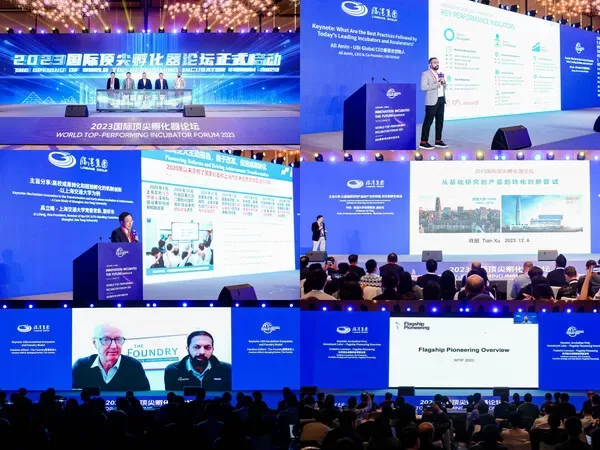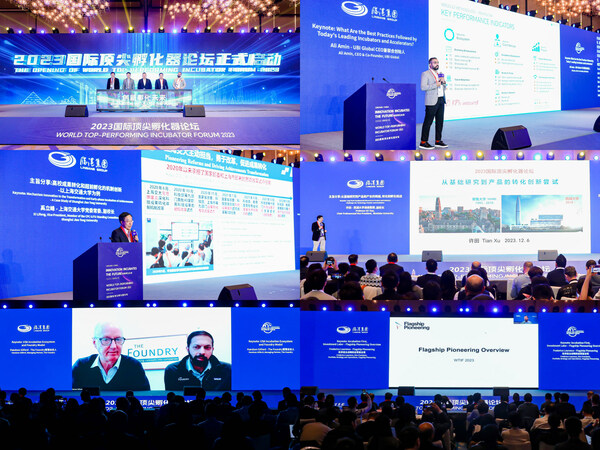Gathering World’s Top Experts to Construct Global Framework for AI Governance
HONG KONG, Dec. 11, 2023 /PRNewswire/ — The Hong Kong University of Science and Technology (HKUST) and Tsinghua University jointly launched the ‘International AI Cooperation and Governance Forum 2023’ from December 8th to 9th. The two-day forum brought together over 50 world-renowned artificial intelligence (AI) experts, scholars, industry leaders, government representatives and international organization delegates to explore the opportunities and challenges brought by cutting-edge technologies such as generative AI, and discuss strategies for building a comprehensive global governance framework for the new technology.
The rapid development of generative AI in recent years has embarked a new era of AI research and development, however, there were numerous security considerations in its applications. The US and European governments have taken steps in regulating generative AI through different rules and orders. As a significant international conference in the field of AI governance, this forum has gained support from organizations worldwide including the United Nations (UN) Development Program and the United Nations Educational, Scientific and Cultural Organization (UNESCO). It also attracted representatives from government departments in the Mainland, European Union, Singapore, Brazil, South Africa and Malaysia, as well as academicians from the Chinese Academy of Engineering (CAE) and the Chinese Academy of Sciences (CAS). Top AI experts from countries such as UK, US, France, and Germany, as well as senior executives from well-known science and technology innovation enterprises, addressed and discussed the challenges as a result of the paradigm shift brought by AI.
Officiating guests of the forum were Ms. LU Xinning, Deputy Director of the Liaison Office of the Central People’s Government in the HKSAR (CLO), Mr. FANG Jianming, Deputy Commissioner of China’s Foreign Ministry in the HKSAR, Prof. SUN Dong, Secretary for Innovation, Technology and Industry of the HKSAR Government, Prof. Harry SHUM, HKUST Council Chairman, Prof. Nancy IP, President of HKUST, Prof. WANG Hongwei, Tsinghua University Vice President, Prof. XUE Lan, Dean of Schwarzman College and Institute for AI International Governance at Tsinghua University, Dr. YBhg. Datuk Ts. Dr. Mohd Nor AZMAN HASSAN, Deputy Secretary General of the Ministry of Science, Technology and Innovation of Malaysia, and Prof. WANG Weiming, Director-General of Educational, Scientific & Technological Affairs at CLO.
Prof. Tshilidzi MARWALA, Under-Secretary-General of the United Nations, Mr. Manuel Innocencio DE LACERDA SANTOS JR., Consulate General of Brazil in Hong Kong, Mr. Thomas GNOCCHI, Ambassador of the European Union office to Hong Kong and Macao, Mr. Mojalefa MOGONO, Consulate General of South Africa in Hong Kong & Macau, addressed the audience after Prof. GUO Yike, HKUST Provost and Prof Xue Lan from Tsinghua University delivered introductory remarks. About 600 people have joined the two-day forum, other viewers watched live broadcast online.
Turing Prize Winner Prof. Yoshua BENGIO, Founder and Scientific Director of Mila – Quebec AI Institute hailed by the media as one of the “Godfathers of AI, delivered a keynote speech on the second day of the forum. He shared on how to strike a balance between the two management models that manage frontier AI risks: democratic governance, which prioritizes public interest and regulation, and techno-libertarianism, which emphasizes autonomy and innovation, in order to achieve social inclusion and sustainable development of AI.
Prof. SUN Dong, Secretary for Innovation, Technology and Industry, said in his opening speech, “Hong Kong is sparing no effort to seize the opportunities brought by AI for digital innovation, while we are also aware of the challenges it posed. The Government has developed the Ethical AI Framework which provides guidance in implementing AI projects and managing the associated risks, while promoting responsible AI practices. I would like to express my gratitude to HKUST and Tsinghua University for co-hosting this Forum, which will be a catalyst to generate intelligently more innovative ideas about AI development and provide more pointers to the robust development of the AI industry in terms of stronger cooperation and enhanced governance.”
Prof. Harry Shum, renowned AI expert, Co-chairperson of the Forum’s Academic Committee and HKUST Council Chairman, said in his welcome remarks, “The strides we have made in AI in recent years have surpassed what we could have imagined just a decade ago. Both corporate and academic worlds are pushing the boundaries, endeavoring to reach human-like competencies in a wide range of tasks. Yet, as we navigate the complexities of AI, it is equally crucial to consider the societal repercussions it may bring, and the importance of establishing some guiding principles and framework. HKUST is privileged to co-organize this forum with our long-standing partner Tsinghua University, providing a platform for critical discussions that will guide the future trajectory of AI.”
Prof. Nancy Ip, Co-chairperson of the Forum’s Organizing Committee and HKUST President, said in her welcome remarks, “Governance is vital to advance and popularize the use of any new technology. This forum we are holding with Tsinghua today provides an invaluable platform for collaboration and thought-provoking discussions on how we could apply AI to create a better, more inclusive and sustainable world. HKUST is committed to advance the AI ecosystem. While we continue to strengthen international collaborations in this area and pioneer AI’s application and development in different fields, we will also enhance our infrastructure capacity through the construction of an Innovation Building that promotes cross-disciplinary and collaborative research, as well as a high-performance computational facility to further enhance our research capabilities in AI.”
Prof. WANG Xiqin, President of Tsinghua University and another co-chair of the organizing committee, said in his welcome remarks, “AI governance is crucial for humanity’s fate. As the birthplace of technological innovation, leaders in social development and inheritors of human civilization, universities have greater responsibilities in strengthening global governance of AI risks. Tsinghua University attaches great importance to scientific research, innovation, ethics education, and governance in AI, and sincerely look forward to working with global partners to empower the world and contribute to the construction of a shared future for mankind.”
Prof. Wang Hongwei, Vice President of Tsinghua University and co-deputy-chair of the organizing committee, said, “Tsinghua University is committed to using this forum as a platform to foster extensive exchanges and cooperation with partner universities and institutions, including HKUST. Together, we will advance the healthy and sustainable development of AI and improve the global governance framework.”
Meanwhile, HKUST and Peng Cheng Laboratory also signed an agreement at the forum to conduct collaborative research and jointly cultivate talents in AI related areas.
Keynote speakers for the first day included Mr. Brad SMITH, Vice Chair and President of Microsoft, Prof. GAO Wen, Director of Peng Cheng Lab and CAE Academician, Prof. DAI Qionghai, Dean of Information Science and Technology and Director of Beijing National Research Center for Information Science and Technology at Tsinghua University, and Dr. Stephen CAVE, Director of the Leverhulme Centre for the Future of Intelligence at the University of Cambridge. They presented on topics spanning security issues in the development of next generation AI, intelligent photoelectronic computing, and the three waves of AI ethics.
Keynote speakers for the second day were Prof. ZHANG Bo, CAS academician and Honorary Dean of the Institute for Artificial Intelligence at Tsinghua University, Prof. Dame Wendy HALL, Regius Professor of Computer Science at the University of Southampton, Prof. Shahbaz KHAN, Director of UNESCO’s Cluster Office in Beijing, and Turing Prize winner Prof. Yoshua Bengio from the Université de Montréal.
A highlight of the forum is the roundtable discussion chaired by Dr. Liesbeth VENEMA, Chief Editor of the authoritative scientific journal Nature Machine Intelligence. She was joined by Prof. Pascale FUNG, Director of the Center for Artificial Intelligence Research (CAiRE) and Chair Professor in the Department of Electronic and Computer Engineering at HKUST, Prof. ZHENG Liang, Vice Dean of the Institute for AI International Governance of Tsinghua University, Prof. Rostam J. NEUWIRH, Head of Department of Global Legal Studies at University of Macau, Dr. Serge STINCKWICH, Head of Research at the United Nations University Institute in Macau, and Prof. TAN Jianrong, a CAE academician from Zhejiang University. The panel engaged in in-depth dialogue over the development of a global governance framework for AI.
Other key sessions included a dialogue on the development of AI ethics among Prof. Pascale Fung, Chloé BAKALAR, Chief Ethicist of Meta’s Responsible AI division, and Joaquin Quiñonero CANDELA, AI Technical Fellow at LinkedIn. The trio discussed how to achieve a balance from three aspects of mathematics, ethics and politics, in the process of practicing and applying AI.
Scholars from renowned institutions including Technical University of Munich, Sorbonne University, University of Edinburgh, University of Southampton and Carnegie Council for Ethics in International Affairs, as well as senior executives from well-known scientific and technological enterprises such as Anthropic, xAI, Huawei, and Baichuan AI, also shared their insights on the strategies to address challenges such as those posed by generative AI.
Download photos of the forum here: http://udz039.ust.hk/~meu/AI_Forum_2023

























